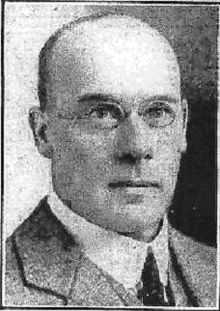John Hope Simpson

Sir John Hope-Simpson KBE CIE OBJ[1] (23 July 1868 – 10 April 1961) was a British Liberal politician who served as a Member of Parliament in the United Kingdom and later in the Government of the Colony of Newfoundland.
Born in West Derby, Hope-Simpson held numerous governmental posts before his retirement in 1916, having been acting chief commander of the Andaman and Nicobar Islands.
Hope-Simpson was in the Indian Civil Service between 1897 and 1916. He was Private Secretary to the Ministry of Labour in 1917. John was elected at the 1922 general election as Member of Parliament (MP) for the previously Conservative-held constituency of Taunton in Somerset.
He was re-elected in 1923 general election, but was defeated at the 1924 general election. He did not stand for Parliament again. In 1925 he was posted to Greece for the British Army, where he was the vice-president for the Refugee Settlement Committee.[2] He authored the Hope Simpson Report in 1930, following the widespread 1929 Palestine riots. He is known for his work on the question of refugees.
In 1931 he became director-general of the Chinese National Government Flood Relief Commission, where in 1934 he commented on the Japanese bombing of a flood refugee camp. He was knighted with the Order of Brilliant Jade for his work as director-general.
Coming out of retirement at 66 years of age, Sir John Hope Simpson became the Commissioner of Natural Resources and Acting-Commissioner of Justice for The Commission of Government of Newfoundland from 1934 until 1936.[3]
Port Hope Simpson, Newfoundland and Labrador was named after him in response to the backing he had given to John Osborn Williams the owner of the Labrador Development Company Limited who set-up a loggers' camp in Alexis Bay for cutting and exporting pitwood to Cardiff for the collieries of South Wales. [4]
Simpson also established the Newfoundland Rangers a welfare and police force, meant to link the people of Newfoundland and Labrador with The Commission of Government in St. John's.
In 1937 Sir John received the Knights Commander of the British Empire medal not so very long after his return from Newfoundland. Sir John continued to be involved in the Jewish/Palestine Question after World War II. He contributed to the Report to General-Assembly, in 1947, for the United Nations Special Committee on Palestine.[5]
Sir John Hope-Simpson died on the 10 April 1961. He left £29,764 16s to an unknown heir.
See also
- Hope Simpson Royal Commission
- "Sir John Hope Simpson". Encyclopædia Britannica. Retrieved May 5, 2006.
- Newfoundland and Labrador Heritage
- Craig, F. W. S. (1983) [1969]. British parliamentary election results 1918-1949 (3rd edition ed.). Chichester: Parliamentary Research Services. ISBN 0-900178-06-X.
Bibliography
- John Hope Simpson, Refugees: preliminary report of a survey, Institute of International Affairs, 1938
- John Hope Simpson, The Refugee Problem, Institute of International Affairs, October 1939
References
- "Sir John Hope Simpson". Encyclopædia Britannica. Retrieved May 5, 2006.
- Newfoundland and Labrador Heritage
- Craig, F. W. S. (1983) [1969]. British parliamentary election results 1918-1949 (3rd edition ed.). Chichester: Parliamentary Research Services. ISBN 0-900178-06-X.
- Leigh Rayment's Peerage Pages
External links
- Hansard 1803–2005: contributions in Parliament by John Simpson
| Parliament of the United Kingdom | ||
|---|---|---|
| Preceded by Sir Arthur Griffith-Boscawen |
Member of Parliament for Taunton 1922–1924 |
Succeeded by Andrew Hamilton Gault |
|